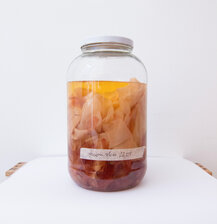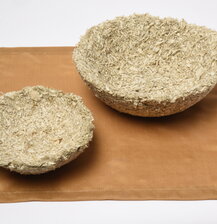Wintersemester 2018/2019,
FERMENTS
Fermentation is a natural phenomenon in a broader sense. Occurring all the time, it can be seen as the process of transformation of any organic substrate playing a major role even in every nutrient cycle on this planet. This process is based upon the help of some tiny microbes - primarily bacteria and fungi.
Humans developed a very sophisticated way of applying this phenomenon in food processing, preservation and particular chemical applications. A lot of cultures have long traditions and a vast variety of recipes depending on their local resources and environmental circumstances.
Embracing the transformational power of the microbes, humans have lived already for a long time in symbiosis with them. But it is important to respect and understand that these tiny organisms form big communities and only survive collaborating with each other. This suggests to think about new options of co-creation, thereby redefining the conventional concepts of producer and consumer.
This newly formed intimate relationship reflects the interdependency of living beings and their surroundings in a wider and at the same time always unique fashion. Caring for a balanced relationship humans can actively take part in a sustainable shaping of their environment: Making the unseen - microbial life around us and an element of our identity - visible and thus activating a greater collective. In what way can we then incorporate fermentation as a means of connecting to the place we live in?
In that context three fermentation practices were diverted from its intended use and examined: Kombucha fermentation, vegetable fermentation and mold fermentation. All three usually applied on food to preserve it, increase its health benefits or simply its taste. In replacing the eatable substrate with a waste product or adding a material for dyeing, the transformational potential of the microbes involved was explored.



